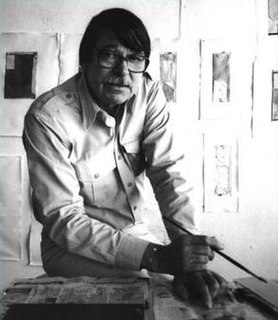A Quote by Johann Wolfgang von Goethe
Pity on the person who has become accustomed to seeing in necessity something arbitrary, who ascribes to the arbitrary some sort of reason, and even claims that following that sort of reason has religious value.
Related Quotes
The claim is also sometimes made that science is as arbitrary or irrational as all other claims to knowledge, or that reason itself is an illusion. As Ethan Allen said Those who invalidate reason ought seriously to consider whether they argue against reason with or without reason; if with reason, then they establish the principle that they are labouring to dethrone. If they argue without reason, which they must do, in order to be consistent with themselves, they are out of reach of rational conviction, nor do they deserve a rational argument.
How on earth can religious people believe in so much arbitrary, clearly invented balderdash?....The acceptance of a creed, any creed, entitles the acceptor to membership in the sort of artificial extended family we call a congregation. It is a way to fight loneliness. Any time I see a person fleeing from reason and into religion, I think to myself, There goes a person who simply cannot stand being so goddamned lonely anymore.
A sort of war of revenge on the intellect is what, for some reason, thrives in the contemporary social atmosphereThe ideas of a time are like the clothes of a season: they are as arbitrary, as much imposed by some superior will which is seldom explicit. They are utilitarian and political, the instruments of smooth-running government.
We have more than two options. A critique of reason does not have to be a call for the return of superstition and arbitrary power. Our problems do not lie with reason itself but with our obsessive treatment of reason as an absolute value. Certainly it is one of our qualities, but it functions positively only when balanced and limited by the others.
If [Sean] doesn't see me a few days or if I'm really, really busy, and I just sort of get a glimpse of him, or if I'm feeling depressed without him even seeing me, he sort of picks up on it. And he starts getting that way. So I can no longer afford to have artistic depressions. If I start wallowing in a depression, he'll start coming down with stuff, so I'm sort of obligated to keep up. And sometimes I can't, because something will make me depressed and sure as hell he'll get a cold or trap his finger in a door or something, and so now I have sort of more reason to stay healthy or bright.
There's a rule for what makes good fantasy work, and it's as strange as any riddle ever posed in a fairy tale: In fantasy, you can do anything; and therefore, the one thing you must not do is 'just anything.' Why? Because in a story where anything can happen and anything can be true, nothing matters. You have no reason to care what happens. It's all arbitrary, and arbitrary isn't interesting.
I think part of the reason I'm attracted to Foster is because he's such a mess. I mean, the people I have loved in my life have never been easy to love. I'm not used to normal. I'm used to disaster. I don't know, as messed up as he is, he's also sort of exciting, sort of a challenge. I'm accustomed to working for love.
The starting point and the ending point are nothing but two arbitrary choices. You make them as in soccer games, where they chose that it's 90 minutes, not less and not more. But the choices are the responsibility of the filmmaker. You have to choose to join the story at an arbitrary point, and you leave it at an arbitrary point.
The reason it's worth standing up for punctuation is not that it's an arbitrary system of notation known only to an over-sensitive elite who have attacks of the vapours when they see it misapplied. The reason to stand up for punctuation is that without it there is no reliable way of communicating meaning.
To plead the organic causation of a religious state of mind, then, in refutation of its claim to possess superior spiritual value, is quite illogical and arbitrary, unless one have already worked out in advance some psycho-physical theory connecting spiritual values in general with determinate sorts of physiological change. Otherwise none of our thoughts and feelings, not even our scientific doctrines, not even our dis -beliefs, could retain any value as revelations of the truth, for every one of them without exception flows from the state of their possessor's body at the time.
As the American Muslim community gets a little bit freer in terms of not being under the thumb of that kind of oppressive mentality, there is going to be some internal dissent. When you are consciously oppressed, you tend to sort of band together and unite because there's a necessity to do so. And that as that proceeds, some of those difference get more into the fore and I think that's the reason you are seeing some internal dissension as a byproduct of the fact that there is not this kind of immediate urgency to unify against this kind of onslaught because that onslaught is refuted.






































